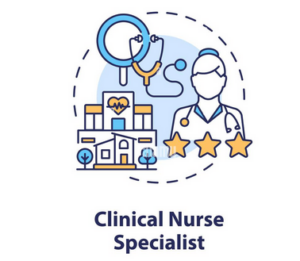Clinical Nurse Specialist Career Overview
 Clinical Nurse Specialists (CNSs) are advanced practice registered nurses who specialize in a specific area of healthcare. They provide expert care, improve patient outcomes, and enhance the quality of healthcare services.
Clinical Nurse Specialists (CNSs) are advanced practice registered nurses who specialize in a specific area of healthcare. They provide expert care, improve patient outcomes, and enhance the quality of healthcare services.
CNSs hold a master’s or doctoral degree in nursing and have advanced clinical training.
One of the main roles of a CNS is to assess and diagnose patients. They work closely with doctors and other healthcare professionals to create effective treatment plans. By utilizing their expertise, CNSs help manage complex health issues, ensuring patients receive the best care possible.
CNSs also play a crucial role in patient education. They help patients and their families understand health conditions, treatment options, and self-care practices. This empowers patients to take an active role in their health, leading to better adherence to treatment and improved health outcomes.

Struggling to meet your deadline?
Get your assignment on Clinical Nurse Specialist Career Overview done by certified MDs and PhDs in the USA. ORDER NOW!
In addition to direct patient care, CNSs focus on healthcare system improvements. They analyze patient data and outcomes to identify areas for enhancement. By implementing evidence-based practices, CNSs contribute to developing policies and protocols that benefit the entire healthcare team.
CNSs often take on leadership roles within healthcare settings. They mentor and support other nurses, fostering a culture of learning and professional growth. Their expertise is vital in training staff and promoting best practices, which ultimately enhances patient care. Clinical Nurse Specialists (CNSs) play diverse roles as educators, advisors, practitioners, researchers, and leaders. This article offers insights into the CNS career path, CNS responsibilities, and the necessary nursing education for this role.
Role of a Clinical Nurse Specialist
CNSs deliver patient care within specialized fields like adult-gerontology, family practice, neonatal care, pediatrics, psychiatric mental health, and women’s health. They collaborate with fellow nurses and medical staff, often holding leadership positions such as nurse educators, advisors, researchers, and policy advocates.
15 Great Nursing Careers in Assisted Living Settings
CNSs commonly perform these tasks, which are part of their CNS responsibilities:
- Providing or aiding in direct patient care
- Educating nurses and staff
- Leading evidence-based projects
- Instructing patients, families, and community members
- Guiding nursing students
- Participating in or supporting research efforts
Key Skills
To be effective, CNSs should have the following key skills:
- Attention to detail
- Effective communication and critical thinking
- Compassion
- Strong leadership
- Resourcefulness
Work Settings for Clinical Nurse Specialists
Over a third of CNSs work in hospitals with acute care patients, nearly 30% are employed in academic health centers, and 10% engage in nursing education at academic institutions. Below are common roles and responsibilities:
- Hospital – Acute Care: CNSs oversee patient care, manage acute care and improvements, and supervise and educate nursing staff.
- Academic Health Center – Acute Care: CNSs offer acute care consultation, implement evidence-based practices, and evaluate nursing students.
- Nursing Education – Academia: CNSs lecture and design courses, develop curriculum, and conduct research on best practices.
Comparison with Nurse Practitioners
Though their roles may overlap, Clinical Nurse Specialists and Nurse Practitioners (NPs) differ in their practice focus. Generally, NPs provide advanced nursing care as part of healthcare provider teams. CNSs manage, educate, and facilitate safe and effective practices within healthcare systems.
Clinical Nurse Specialist
- Practice defined by care type, medical specialty, and patient population
- Requires a master’s or Doctor of Nursing Practice (DNP) degree
- Median annual salary around $91,300
- Responsibilities encompass expert consultation, applying evidence-based practices, healthcare administration, improving system and patient outcomes, and teaching
Nurse Practitioner
- Practice defined by patient population
- Requires a master’s or DNP degree
- Median annual salary approximately $114,510
- Duties include direct patient care, primary care diagnoses, health assessments, treatment, medication prescribing (if permitted by state law), disease prevention, education, and diagnostic testing
Career Path to Becoming a CNS
The following steps outline the CNS career path to becoming a CNS. While a Master of Science in Nursing (MSN) is currently the minimum requirement, the National Association of Clinical Nurse Specialists (NACNS) supports a shift to the DNP for Clinical Nurse Specialists by 2030.
- Obtain a Bachelor of Science in Nursing (BSN).
- Pass the National Council Licensure Examination for RNs (NCLEX-RN) to become a licensed RN.
- Apply to an accredited CNS program, typically requiring a year of clinical experience, a BSN, and program-specific prerequisite coursework.
- Complete an MSN or DNP degree. MSN programs take around two years, while BSN-to-DNP programs take around six years.
- Apply for CNS certification from organizations such as the American Association of Critical-Care Nurses or the American Nurses Credentialing Center.
Salary and Job Outlook for CNSs
On average, CNSs earn a base salary of about $91,300 per year, with total pay including bonuses and benefits ranging from $60,000 to $125,000. The U.S. Bureau of Labor Statistics reports a median annual salary of $117,670 for advanced practice registered nurses (APRNs), considering CNSs equivalent to APRNs. A 2018 survey shows a median Clinical Nurse Specialist salary of $95,720.
Salaries vary by location. For instance, CNSs in Los Angeles earn 33% above the national average, followed by New York City (27%) and Seattle (20%). In contrast, Milwaukee CNSs earn 8% less than the national average.
Frequently Asked Questions
- Why is earning a DNP recommended for Clinical Nurse Specialists? The NACNS advocates for the DNP as the minimum requirement for CNSs due to the evolving nature of nursing practice and increasingly complex patient needs.
- Which certifications are popular among Clinical Nurse Specialists? The NACNS notes that adult health/gerontology is the favored certification specialty, with over 75% of CNSs choosing this credential. Other specialties include pediatrics (9%), family practice (5%), psychiatric/mental health (4%), women’s health/gender-specific (4%), and neonatal (3%).
- Can Clinical Nurse Specialists prescribe medication? Prescriptive authority for CNSs depends on state laws. Some states grant independent prescribing authority, while others restrict it to psychiatric CNSs or require supervision or collaborative agreements with physicians.
- Where do NNPs (Neonatal Nurse Practitioners) work? NNPs work in settings like neonatal intensive care units (NICUs), neonatal clinics, labor and delivery units, and maternal-fetal medicine practices. Their role involves caring for critically ill newborns and premature infants.
Overall, Clinical Nurse Specialists are essential in bridging the gap between patients and healthcare systems. Their advanced skills, knowledge, and leadership improve patient care, making them a valuable asset in today’s healthcare environment. Whether in hospitals, clinics, or community health settings, CNSs make a significant difference in the lives of patients and the effectiveness of healthcare services.

Dont wait until the last minute.
Provide your requirements and let our native nursing writers deliver your assignments ASAP.

